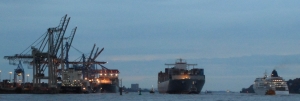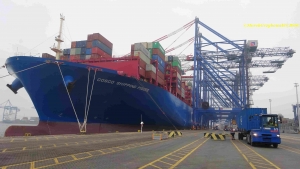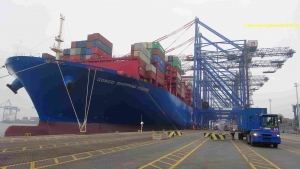Container ship operators are operating on losses


 By Marek Grzybowski
By Marek Grzybowski
Will container ship operators see rock bottom in budgets by 2028? And will cargo handlers, forwarders, logisticians and terminals have holes in their pockets? 2023 was not a good year for container ship operators. 2024 is expected to be no better, not only for liner shipowners. The excessive supply of cargo space and the economic slowdown affected shipowners with low freight rates.
The reduction in profits had an impact on balance sheets. Corporate managers are trying to save finances with revenues from logistics and terminal activities. The extension of line connection routes will certainly have an impact on operating results. This is the result of the decision to avoid crossing the Red Sea.
We inform on an ongoing basis about the decisions of liner shipowners related to the threat of missile and pirate attacks in the Red Sea on GospodarkaMorska.pl [https://www.kropamorska.pl/one-dolacza-do-firm-rezygnujacych-z-tras-zeglugowych-leadingowych -through-the-red-sea-75311; https://www.gospodarkamorska.pl/rosnie-grono-firm-rezygnujacych-z-zeglugi-prze-morze-czerwone-75289]
However, the situation of line operators is influenced by the excessive transport capacity of container ships. In 2024, the costs of operating linear fleets will increase as a result of large units paying environmental fees. Some operators planned to shorten ocean connections to Europe and redirect ships to North African ports. The situation in the Red Sea may delay these movements in 2024, but not stop them.
– If the oversupply of container tonnage continues next year, this, together with stricter environmental regulations, will result in more scrapping of older tonnage and a continuation of slow-steaming – said Xiao Junguang, Cosco corporate secretary recently, and noted optimistically that “looking to 2024 , the global economy is expected to stabilize and recover. According to WTO estimates, global trade is estimated to increase by 3.3%,” Xiao Junguang was quoted by The Lobster.
There will be an oversupply of tonnage by 2028
The Sea-Intelligence report, published in autumn, shows that the current oversupply of tonnage will peak next year and will be completely eliminated by 2028. Then, the supply of cargo space on container ships will probably be balanced with the demand for container transportation. The instability in maintaining regular connections is not good for airline operators and their customers. Supply chains and production logistics are breaking down, although companies are increasing stockpiles of strategic components after the pandemic.
– Overall schedule reliability remained unchanged in September and October 2023 and remained at 64.4%. Apart from the increase in May, the reliability of timetables from March 2023 is around 2%. On a year-to-year basis, the reliability of schedules was higher by 12.6% – informs Sea-Intelligence in the 147th Global Liner Performance (GLP) report.
Sea-Intelligence analysts said the average delay for late arrivals continued to increase, increasing by 0.33 days from September to 4.90 days in October.

COSCO with stable financial results
Despite the worse situation in the ocean liner transport market, the operational dynamics of COSCO SHIPPING Holdings Co., Ltd. (SSE: 601919; HKEx: 1919) in the first three quarters of this year. was relatively stable.
During 9 months this year The holding achieved RMB 134.56 billion (RMB 1 – USD 0.14). As a result, earnings before interest and taxes amounted to RMB 33.23 billion. Net profit was RMB 26 billion and shareholder profit was RMB 22.07 billion.
Revenues from logistics using IT and satellite systems amounted to RMB 21.84 billion (excluding sea freight). They increased by 8.69% year on year. The holding company’s investment income for the first three quarters reached RMB 3.77 billion. This is thanks to an increase of 86.71% year-on-year.
– the ratio of the Company’s liabilities to assets was 47.58% at the end of September 2023, which means a decrease of 3% compared to the end of last year, COSCO informs.
COSCO SHIPPING Ports sales in the third quarter of 2023 increased by 2.7% y/y to USD 358.9 million. Operating costs increased by 4.4% y/y to USD 258 million. Gross profit decreased by 1.4% y/y to USD 100.9 million. Profit attributable to the Group’s shareholders in this period amounted to USD 83.3 million, which means a decrease of 4.0% y/y.
CMA CGM – 50% decreases
CMA CGM’s revenues decreased by 42.6% year-on-year to USD 11.43 billion in the third quarter of 2023 compared to USD 19.9 billion in the same period in 2022. The shipping services played an important role in stabilizing the balance sheet of the French shipowner and logistics. Their revenue of $3.76 billion in Q3 2023 contributed 32% of total revenue.
CMA CGM management said the new tonnage, which will come to market in 2024, will increase maritime transport capacity. And this will further reduce freight rates. 2024 will still be a weak year for container ship operators, even though macroeconomic forecasts for next year predict slow economic growth and a slight recovery.
Therefore, in the following quarters we will have to come to terms with similar results as in the third quarter of 2023. The operator from Marseille, using the synergy effect from combining ocean transport with logistics and forwarding, recorded a net profit of USD 388 million for the third quarter of 2023. In the third quarter in the 2022 quarter, USD 7.04 billion was obtained. The decline in net profit is shocking, as it amounts to 94% and is similar to that of many competitors.
After the pandemic, container transport reached the ocean floor. Market conditions in 2024 will worsen even further as new mega container ships hit the oceans.
Despite a marked decline in sales and profits, Rodolphe Saadé, president and CEO of CMA CGM Group, was quoted by Seatrade Maritime as saying that the industry continued to normalize in the third quarter, with a return to pre-pandemic market conditions. However, our results remained very solid, confirming the viability of our terminal and logistics growth strategy. We are therefore more resilient as we enter this new cycle.
Maersk is sailing in business storms
– Financial results of A.P. Moller – Maersk for the third quarter of 2023 were in line with expectations in a difficult market environment, with rates significantly different from the peak levels of 2022, Vincent Clerc, CEO of A.P., reported on the social networking site. Moller-Maersk.
Revenues from the sale of services amounted to USD 12.1 billion, which, compared to USD 22.8 billion in the third quarter of 2022, is an extremely drastic decline. EBIT was positive, reaching 4.4%.
Sea transport achieved a 9% increase in volumes compared to the previous summer quarter. Strong activity was focused on cost containment. As a result, it was possible to achieve an 11% decrease in unit costs in the case of bunker fuel consumption compared to the third quarter of 2022. However, EBIT was negative and amounted to USD 27 million compared to USD 8.7 billion in the third quarter of 2022. For this result Exchange rate differences also had an impact – particularly unfavorable ones in trade from Asia to Europe, North America and Latin America.
Stabilization of finances in the logistics and terminals business
A.P. Moller-Maersk was not saved even by revenues from logistics and services, which amounted to USD 3.5 billion. In the third quarter of 2022, they were higher and amounted to USD 4.2 billion.
– Lower prices had a negative impact on this segment, especially in the aviation and forwarding markets, while volumes basically returned to last year’s level – explains Maersk management and explains that better cost management helped stabilize margins.
Even container terminals recorded lower revenues than last year. In the third quarter of this year they were at $1.0 billion compared to $1.1 billion in Q3 2022, reflecting lower storage demand due to reduced global congestion and a 4.1% decline in volume.
– The results were good thanks to the synergy of price adjustments and cost control – explains Maersk, emphasizing that the return on invested capital (ROIC) increased to 10.3% and was higher than the forecast set for 2025 at 9%.
Will it be as many market experts predict by 2028? Hard to say. The costs of linear ocean transport will certainly increase if goods are transported around Africa for a longer period. If we add CO2 emission fees and an increase in logistics and terminal fees, those using global supply chains in 2024 will not feel comfortable.
Liner shipowners will try to cover losses resulting from low freight rates by generating revenues from other types of activities.
